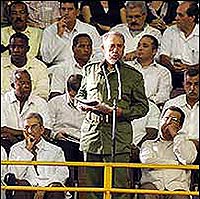 A large portion of the Cubans denied exit visas are doctors and other health care professionals. Of the cases reported to the U.S. Interests Section, roughly half fell into this category.
A large portion of the Cubans denied exit visas are doctors and other health care professionals. Of the cases reported to the U.S. Interests Section, roughly half fell into this category. The reason so many health care professionals are denied exit visas is the Public Health Ministry’s “Resolution 54”—or at least that is what many of them are told when their petitions are rejected. However no one we interviewed had ever seen the regulation—not evens those who requested copies when it was cited to deny them exit visas. “It’s like a phantom law,” one doctor told Human Rights Watch. “No one has seen it in writing.”
By most accounts, “Resolution 54” requires health care professionals applying for exit visas to wait three to five years before their application will be considered. Some doctors report that the rule specifies they spend these waiting years working in rural communities.
If the actual text of the regulation has been kept from the public, the rationale behind it has not. The restriction is part of a broader effort to prevent a “brain drain” of skilled professionals from Cuba. President Castro has accused the United States of actively luring large numbers of skilled professionals from Cuba, “thus depriving our country of medical doctors, engineers, architects and other university graduates who have been educated here, absolutely free of charge.” And he has vowed that Cuba would not tolerate an exodus of professionals, declaring that the country would not be exploited as “an incubator of brains,” and that “those [brains] it does incubate are primarily to serve our people and our brother countries in the world that suffer from plundering and poverty, not to fatten the pockets of the plunderers of the world.”
Yet, as the case of Dr. Hilda Molina above illustrates, this restriction is applied to doctors who have already made significant contributions to Cuba’s health care system. And as Dr. Molina’s case also demonstrates, one result of the policy is the forced separation of families.
Dr. Edelma Almaguer Pomares, for example, was denied an exit visa in 2004 on professional grounds after winning a U.S. visa through the immigration lottery in June 2003. Earlier in 2004, her husband, who had a U.S. visa that was expiring, had traveled to the United States expecting that Dr. Almaguer and their daughter would soon be able to join him. Under the current regulation, Dr. Almaguer will not be allowed to leave Cuba for another three years.
Similarly, Arturo Morejón won a visa to the United States in the lottery and left Cuba in October 2002. His wife, Dr. Rita María Aguilar, has been told that because she is a doctor, she could not leave for another five years. Dr. Jorge Ramos fled a medical mission in Venezuela in 2003. His wife and son have been unable to leave Cuba because she, too, is a doctor.
Roberto Gómez felt compelled to leave Cuba in August 2001 because, he said, a relative’s activities as a political dissident had closed off professional opportunities for everyone in his family. His wife was unable to obtain an exit visa because she is a doctor, so he traveled alone. The couple had planned to have children, but chose to put it off, knowing they faced a separation of at least several years. Unwilling to wait longer, in early 2005 they paid someone to bring her out of the country illegally.
Human Rights Watch
No hay comentarios:
Publicar un comentario